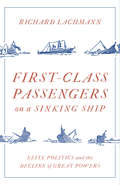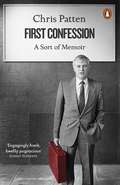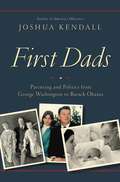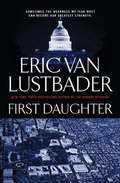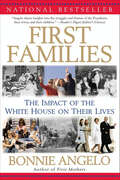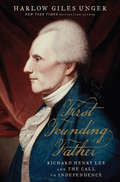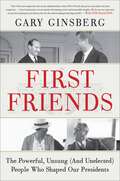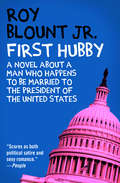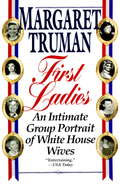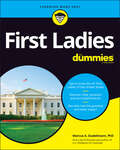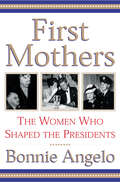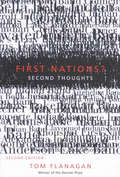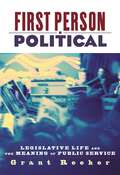- Table View
- List View
First Casualty: The Untold Story of the Battle That Began the War in Afghanistan
by Toby Harnden'Gripping ... A terrific action narrative' Max Hastings 'Reads like a Tom Clancy thriller, yet every word is true ... This is modern warfare close-up and raw' Andrew Roberts Bestselling and Orwell Prize-winning author Toby Harnden tells the gripping and incredible story of the six-day battle that began the War in Afghanistan and how it set the scene for twenty years of conflict. The West is in shock. Al-Qaeda has struck the US on 9/11 and thousands are dead.Within weeks, UK Special Forces enter the fray in Afghanistan alongside the CIA's Team Alpha and US troops.Victory is swift, but fragile. Hundreds of jihadists surrender and two operatives from Team Alpha enter Qala-i Jangi – the 'Fort of War' – to interrogate them. The prisoners revolt, one CIA man falls, and the other is trapped inside the fort. Seven members of the SBS – elite British Special Forces – volunteer for the rescue force and race into danger and the unknown.The six-day battle that follows proves to be one of the bloodiest of the Afghanistan war as the SBS and their American comrades face an enemy determined to die in the mud citadel.Superbly researched, First Casualty is based on unprecedented access to the CIA, SBS, and US Special Forces. Orwell Prize-winning author Toby Harnden recounts the gripping story of that first battle in Afghanistan and how the haunting foretelling it contained – unreliable allies, ethnic rivalries, suicide attacks, and errant bombs – was ignored, fueling the twenty-year conflict to come.
First Class Passengers on a Sinking Ship: Elite Politics and the Decline of Great Powers
by Richard LachmannA history of why great powers decline, from Spain to the United StatesThe extent and irreversibility of US decline is becoming ever more obvious as America loses war after war and as one industry after another loses its technological edge. Lachmann explains why the United States will not be able to sustain its global dominance, and contrasts America's relatively brief period of hegemony with the Netherlands' similarly short primacy and Britain's far longer era of leadership.Decline in all those cases was not inevitable and did not respond to global capitalist cycles. Rather, decline is the product of elites' success in grabbing control over resources and governmental powers. Not only are ordinary people harmed, but also capitalists become increasingly unable to coordinate their interests and adopt policies and make investments necessary to counter economic and geopolitical competitors elsewhere in the world.Conflicts among elites and challenges by non-elites determine the timing and mold the contours of decline. Lachmann traces the transformation of US politics from an era of elite consensus to present-day paralysis combined with neoliberal plunder, explains the paradox of an American military with an unprecedented technological edge unable to subdue even the weakest enemies, and the consequences of finance's cannibalization of the US economy.
First Confession: A Sort of Memoir
by Chris PattenChris Patten was a cradle Catholic (hence First Confession), became on the most prominent Tory 'Wets' of the 1980s and 1990s, and went on to hold a series of prominent public offices - Chairman of the Conservative Party, the last Governor of Hong Kong, European Commissioner for External Affairs, Chancellor of Oxford University, Chairman of the BBC, advisor to the Pope - as he self-deprecatingly puts it 'a Grand Poo-bah, the Lord High Everything Else'. He writes with wry humour about his time in all these offices, taking us behind the scenes and showing us unexpected sides of many of the great figures of the day. No political writer is so purely enjoyable as Chris Patten.
First Dads: Parenting and Politics from George Washington to Barack Obama
by Joshua KendallEvery president has had some experience as a parent. Of the 43 men who have served in the nation's highest office, 38 have fathered biological children and the other five adopted children. Each president's parenting style reveals much about his beliefs as well as his psychological make-up. James Garfield enjoyed jumping on the bed with his kids. FDR's children, on the other hand, had to make appointments to talk to him. In a lively narrative, based on research in archives around the country, Kendall shows presidential character in action. Readers will learn which type of parent might be best suited to leading the American people and, finally, how the fathering experiences of our presidents have forever changed the course of American history.
First Daughter (Jack McClure Series #1)
by Eric Lustbader Eric Van Lustbader<P>Jack McClure has had a troubled life. His dyslexia always made him feel like an outsider. He escaped from an abusive home as a teenager and lived by his wits on the streets of Washington, D.C. It wasn't until he realized that dyslexia gave him the ability to see the world in unique ways that he found success, using this newfound strength to become a top ATF agent. <P>When a terrible accident takes the life of his only daughter, Emma, and his marriage falls apart, Jack blames himself, numbing the pain by submerging himself in work. Then he receives a call from his old friend Edward Carson. Carson is just weeks from taking the reins as president of the United States when his daughter, Alli, is kidnapped. Because Emma McClure was once Alli's best friend, Carson turns to Jack, the one man he can trust to go to any lengths to find his daughter and bring her home safely. <P>The search for Alli leads Jack on a road toward reconciliation... and into the path of a dangerous and calculating man-- someone whose actions are as cold as they are brilliant, and whose power and reach are seemingly infinite. <P>Faith, redemption, and political intrigue play off one another as McClure uses his unique abilities to journey into the twisted mind of a stone-cold genius who is constantly one step ahead of him. Jack will soon discover that this man has affected his life and his country in more ways than he could ever imagine.
First Daughter: Extreme American Makeover
by Mitali PerkinsSameera's looking forward to some cool campaign perks: hobnobbing with celebrities, meeting smart and hunky young voters, and getting a total makeover. The makeover succeeds in making her look more polished, but some of the campaign staffers aren't content to stop there. They think the candidate's dark-skinned, adopted daughter could hurt his chances if she doesn't "try to be more American". As the pressure builds, Sameera is forced to choose: Will she hide behind a fake persona or speak up for her true self?
First Dog Fala
by Elizabeth Van SteenwykIn 1940, Fala came to live with President Franklin D. Roosevelt in the White House. On sunny days, the little dog played in the grass outside the Oval Office. He attended important meetings with the president's advisors.
First Families: The Impact of the White House on Their Lives
by Bonnie AngeloA deeply revealing look at presidential family members through history: “Full of sparkling anecdotes . . . [written] with humor and humanity.” —Richmond Times-DispatchWhat is it like when the White House is home? In this book, Time correspondent and author of First Mothers Bonnie Angelo tells the real-life stories of how presidents and their wives, children, and extended families lived day-to-day in an imposing national monument while attempting to keep their private lives out of the public domain.First Families chronicles exhilarating moments as well as dark days at the nation’s most famous address, with behind-the-headlines accounts of picture-book weddings, love affairs, rollicking children, domestic squabbles, and tragic deaths. From activist wives Eleanor Roosevelt and Hillary Clinton to reluctant occupants Bess Truman and Jacqueline Kennedy, to those such as Mary Todd Lincoln, Dolley Madison, and madcap debutante Alice Roosevelt, who embraced their new address and status, here is an unforgettable human portrait of our First Families and how they coped, stumbled, or thrived in the national spotlight.Includes photographs“A sweeping panorama of family life on Pennsylvania Avenue . . . revealing and intimate.” —Kirkus Reviews (starred review)“Makes the lives of those who either loved or loathed their sojourns in the White House as irresistible as a gossip column . . . Angelo is particularly skilled at describing the difficulties White House children, including Lyndon Johnson’s daughters and Amy Carter, had adjusting to life in a fish bowl.” —Publishers Weekly“Covers more than 200 years of American history, popular culture, and presidential trivia. Relying heavily on the recollections and memoirs of presidential family members, White House staff, and D.C. journalists, this chatty slice of Americana is chock-full of fun First Family facts.” —Booklist
First Family: Abigail and John Adams
by Joseph J. EllisThe Pulitzer Prize–winning, best-selling author of Founding Brothers and His Excellency brings America’s preeminent first couple to life in a moving and illuminating narrative that sweeps through the American Revolution and the republic’s tenuous early years.John and Abigail Adams left an indelible and remarkably preserved portrait of their lives together in their personal correspondence: both Adamses were prolific letter writers (although John conceded that Abigail was clearly the more gifted of the two), and over the years they exchanged more than twelve hundred letters. Joseph J. Ellis distills this unprecedented and unsurpassed record to give us an account both intimate and panoramic; part biography, part political history, and part love story.Ellis describes the first meeting between the two as inauspicious—John was twenty-four, Abigail just fifteen, and each was entirely unimpressed with the other. But they soon began a passionate correspondence that resulted in their marriage five years later.Over the next decades, the couple were separated nearly as much as they were together. John’s political career took him first to Philadelphia, where he became the boldest advocate for the measures that would lead to the Declaration of Independence. Yet in order to attend the Second Continental Congress, he left his wife and children in the middle of the war zone that had by then engulfed Massachusetts. Later he was sent to Paris, where he served as a minister to the court of France alongside Benjamin Franklin. These years apart stressed the Adamses’ union almost beyond what it could bear: Abigail grew lonely, while the Adams children suffered from their father’s absence.John was elected the nation’s first vice president, but by the time of his reelection, Abigail’s health prevented her from joining him in Philadelphia, the interim capital. She no doubt had further reservations about moving to the swamp on the Potomac when John became president, although this time he persuaded her. President Adams inherited a weak and bitterly divided country from George Washington. The political situation was perilous at best, and he needed his closest advisor by his side: “I can do nothing,” John told Abigail after his election, “without you.”In Ellis’s rich and striking new history, John and Abigail’s relationship unfolds in the context of America’s birth as a nation.
First Family: George Washington's Heirs and the Making of America
by Cassandra A. GoodAward-winning historian Cassandra A. Good shows how the outspoken stepgrandchildren of George Washington played an overlooked but important role in the development of American society and politics from the Revolution to the Civil War.While it&’s widely known in America that George and Martha Washington never had children of their own, few are aware that they raised numerous children together. In First Family, we see Washington as a father figure, as well as meet the children he helped raise and trace their complicated roles in American history.The children of Martha Washington&’s son by her first marriage—Eliza, Patty, Nelly and Wash Custis—were born into life in the public eye. Raised in the country&’s first &“first family,&” they remained well-known as Washington&’s family and keepers of his legacy throughout their lives. By turns petty and powerful, glamorous and cruel, the Custises used Washington as a means to enhance their own power and status. As enslavers committed to the American empire, the Custis family embodied the failures of the American experiment that finally exploded into civil war—all the while being celebrities in a soap opera of their own making.First Family brings new focus and attention to this surprisingly neglected aspect of George Washington&’s life and legacy. As the country grapples with concerns about political dynasties and the public role of presidential families, the saga of Washington&’s family offers a human story of historical precedent.
First Founding Father: Richard Henry Lee and the Call to Independence
by Harlow Giles UngerBefore Washington, before Jefferson, before Franklin or John Adams, there was Lee--Richard Henry Lee, the First Founding FatherRichard Henry Lee was first to call for independence, first to cal for union, and first to call for a bill of rights to protect Americans against government tyranny. A towering figure in America's Revolutionary War, Lee was as much the "father of our country" as George Washington, for it was Lee who secured the political and diplomatic victories that ensured Washington's military victories. Lee was critical in holding Congress together at a time when many members sought to surrender or flee the approach of British troops. Risking death on the gallows for defying British rule, Lee charged into battle himself to prevent British landings along the Virginia coast--despite losing most of his left hand in an explosion.A stirring, action-packed biography, First Founding Father will startle most Americans with the revelation that many historians have ignored for more than two centuries: Richard Henry Lee, not Thomas Jefferson, was the author of America's original Declaration of Independence.
First Friends: The Powerful, Unsung (And Unelected) People Who Shaped Our Presidents
by Gary GinsbergIn the bestselling tradition of The Presidents Club and Presidential Courage, White House history as told through the stories of the best friends and closest confidants of American presidents. <P><P> Here are the riveting histories of myriad presidential friendships, among them: <br>Abraham Lincoln and Joshua Speed: They shared a bed for four years during which Speed saved his friend from a crippling depression. Two decades later the friends worked together to save the Union. <br>Harry Truman and Eddie Jacobson: When Truman wavered on whether to recognize the state of Israel in 1948, his lifelong friend and former business partner intervened at just the right moment with just the right words to steer the president’s decision. <br>Franklin Delano Roosevelt and Daisy Suckley: Unassuming and overlooked during her lifetime, Daisy Suckley was in reality FDR’s most trusted, constant confidant, the respite for a lonely and overworked President navigating the Great Depression and World War II <br>John Kennedy and David Ormsby-Gore: They met as young men in pre-war London and began a conversation over the meaning of leadership. A generation later the Cuban Missile Crisis would put their ideas to test as Ormsby-Gore became the president’s unofficial, but most valued foreign policy advisor. <P><P> These and other friendships—including Thomas Jefferson and James Madison, Franklin Pierce and Nathaniel Hawthorne, and Bill Clinton and Vernon Jordan—populate this fresh and provocative exploration of a series of seminal presidential friendships. <P><P> Publishing history teems with books by and about Presidents, First Ladies, First Pets, and even First Chefs. Now former Clinton aide Gary Ginsberg breaks new literary ground on Pennsylvania Avenue and provides fresh insights into the lives of the men who held the most powerful political office in the world by looking at the friends on whom they relied. <P><P>First Friends is an engaging, serendipitous look into the lives of Commanders-in-Chief and how their presidencies were shaped by those they held most dear. <P><P><b>A New York Times Best Seller</b>
First Great Triumph: How Five Americans Made Their Country a World Power
by Warren ZimmermannAmerican history around 1900 with a focus on five figures.
First Hubby: A Novel About a Man Who Happens to Be Married to the President of the United States
by Roy Blount Jr.A funny novel of the first &“First Husband,&” from an author who &“writes in the grand tradition of such American humorists as Mark Twain and Will Rogers&” (Library Journal). Guy Fox first encountered Clementine on the campus of Dingler College. She was running, stark naked, away from an on-campus protest and the police who were pursuing her. Guy and Clementine&’s romance wound through turbulent social movements of the &’60s and &’70s, all the way to Clementine&’s ascension to the Oval Office. As the nation&’s very first First Husband, Guy is privy to the surreal intricacies of presidential life, and he sets out to write a light and thoroughly uncontroversial memoir about his relationship with Clementine. But the First Hubby can&’t help but let some of his more mischievous qualities slip through into his book . . . The thoroughly charming First Hubby is an engrossing novel about politics, family, and the art of marriage that &“offers an emphatic and romantic &‘yes&’ to the question &‘Can true love survive the Oval Office&’?&” (The New Yorker).
First Impressions
by Marilyn BolchunosJim is trying to impress his new neighbor while his family is away. Instead, he makes a fool of himself! After a series of mishaps that involve his dad's prized lawnmower, angry hornets, and a bath towel, Jim wonders if things could get any worse. Will he ever get to meet his crush? Or will his first impression scare her away?
First In His Class: A Biography Of Bill Clinton
by David MaranissWho exactly is Bill Clinton, and why was he, of all the brilliant and ambitious men in his generation, the first in his class to reach the White House?Drawing on hundreds of letters, documents, and interviews, David Maraniss explores the evolution of the personality of our forty-second president from his youth in Arkansas to his 1991 announcement that he would run for the nation's highest office. In this richly textured and balanced biography, Maraniss reveals a complex man full of great flaws and great talents. First in His Class is the definitive book on Bill Clinton.
First Ladies
by Margaret TrumanThis well-informed, intimate look at 29 women whose lives were intertwined with those who lead and have led this country presents forthright interviews with Lady Bird Johnson, Hillary Clinton, Nancy Reagan, and others, while warmly recalling Pat Nixon and Jacqueline Kennedy Onassis. Ms. Truman's legendary frankness is present but so, too, is a generosity of spirit. Photos throughout.From the Hardcover edition.
First Ladies For Dummies
by Marcus A. Stadelmann PhDIt’s time for the ladies—the First Ladies, that is—to get their time in the spotlight What does a First Lady do? What makes a First Lady successful? If you’ve always wanted to know, this is the place to come to for the answers! This reference has the inside scoop on all the First Ladies, including Michelle Obama’s campaigns for healthy eating and Jackie Kennedy’s emphasis on art and culture. In First Ladies For Dummies, you’ll find out how these women’s values, initiatives, and style have influenced all our lives, and how they’ve become true role models for generations. With the detailed biographies and personal profiles in First Ladies For Dummies, you’ll gain a well-rounded knowledge of the United States' 47 First Ladies. From Martha to Melania, from Jackie to Dr. Jill, and everyone in between, every First Lady has left her stamp on the White House, in the Rose Garden, and in history, and this book covers it all. It includes: An historical context for a deeper understanding of the world these First Ladies lived in Accounts of their childhoods and early lives to learn who these women were before they stepped foot in the White House Each First Lady's interests and achievements Whether you’re a history fanatic or just curious about these highly accomplished women, you’ll find lots of fun facts about them in First Ladies For Dummies. Pick up your copy to be in the know!
First Lady Florence Harding: Behind the Tragedy and Controversy
by Katherine A. S. SibleyFlorence Kling Harding has come down through history as one of our most scorned first ladies. Victimized by caricatures and branded a shrew, she stands at the bottom of historians' polls, her reputation tarnished by her husband's scandals despite their joint popularity while in office. These depictions, argues Katherine Sibley, have prevented us today from seeing how innovative a first lady Florence Harding really was. This new look at Mrs. Harding restores humanity to an oft-maligned figure by examining her progressive causes, her celebrity, and her role in her husband's work. For if Eleanor Roosevelt is credited with shattering the first lady's ceremonial mold, it was Florence Harding who made the first cracks. Sibley's is the first book to offer a full treatment of Florence as first lady rather than as mere supporting actress in the Harding administration. Never shying from publicity, she made herself more available to the press than did her predecessors and opened the White House up to the public. And she took such a pioneering role in Warren Harding's campaign and presidency that many thought she outdid her husband as a politician. Turning to primary sources that others have overlooked, Sibley challenges the clichés about Florence's time in the national spotlight. She describes how Mrs. Harding supported racial equality, lobbied for better treatment for veterans and female prisoners, and maintained a lifelong interest in preventing animal cruelty. As adviser to her husband, she assisted with his speechwriting and consulted with the cabinet; she was also the first first lady to deliver spontaneous speeches while traveling with the president. At a personal level, Sibley examines in detail how Mrs. Harding responded to her husband's death, assessing why this tragedy struck Americans with such force even as national empathy proved so fleeting. She also offers a more nuanced description of the president's philandering, viewing Nan Britton's claims with skepticism while noting the effects on Florence of his dalliance with Carrie Phillips. Florence Harding bequeathed an activist legacy, and it is due to her example that aspiring presidential wives are expected to campaign with their husbands and be accessible to public and press. Florence Harding truly set the stage for those to follow; this book delivers the full and fair portrait that has long been her due.
First Lady: The Life of Lucy Webb Hayes
by Emily GeerLucy Webb Hayes, married to Rutherford B. Hayes, served as First Lady of the United States from 1877-81. This was an important transitional era in nineteenth-century American history, when the country was still recovering from the Civil War, and a new modern economic and social world was being born. Lucy was the first presidential wife to hold a college degree, and in this way was a role model for the "new woman." Still, as a married woman, she was expected to serve as White House hostess, manage her household, supervise family life, and be a loving and supportive wife. Lucy fulfilled all these roles admirably, with propriety and Christian morality, and was much praised in Washington DC and across the nation for her grace and charm. Where she may have failed the "new woman" was in supporting her husband's view of women's suffrage, which he thought entailed the exercise of political duties that were inconsistent with the demands of maternity. Lucy and her husband famously held a temperance policy for entertaining at the White House, which was a political as much as a moral decision. Historians have often falsely blamed Lucy for this stance, dubbing her "Lemonade Lucy." This comprehensive biography uncovers the truth about the intelligent, warm-hearted woman, adored and respected by her family, who was the ideal nineteenth-century political wife.
First Mothers: The Women Who Shaped the Presidents
by Bonnie AngeloIn this highly acclaimed book, Bonnie Angelo celebrates a group of remarkable women who played a pivotal role in developing the characters of the modern American presidents — their mothers. Angelo, a veteran reporter and writer for TIME magazine, explores the lives, thoughts and feelings of these women who so influenced the twentieth century’s most powerful leaders. From the aristocratic and formidable Sara Delano Roosevelt to diehard Democrat Martha Truman, from stoic Hannah Milhous Nixon to the hard-living Virginia Clinton Kelly, First Mothers is an in-depth look at the special mother-son relationship that has nurtured America’s presidents and helped them to achieve great things. A veteran correspondent at TIME magazine and the first woman to head a TIME foreign bureau, Bonnie Angelo has reported on the White House and presidential families throughout eight administrations. As a Washington correspondent and bureau chief in London and New York, she has covered newsmakers and major events in all fifty states and around the world. “A fascinating book, gracefully written ... gives the reader fresh insights into how the characters and values of our recent presidents were shaped.” — Washington Post Book World
First Nations? Second Thoughts, Second Edition
by Tom FlanaganFlanagan shows that this orthodoxy enriches a small elite of activists, politicians, administrators, and well-connected entrepreneurs, while bringing further misery to the very people it is supposed to help. Controversial and thought-provoking, First Nations? Second Thoughts dissects the prevailing ideology that determines public policy towards Canada's aboriginal peoples.
First Nations? Second Thoughts, Second Edition: Second Thoughts
by Tom FlanaganFlanagan shows that this orthodoxy enriches a small elite of activists, politicians, administrators, and well-connected entrepreneurs, while bringing further misery to the very people it is supposed to help. Controversial and thought-provoking, First Nations? Second Thoughts dissects the prevailing ideology that determines public policy towards Canada's aboriginal peoples.
First Person Political: Legislative Life and the Meaning of Public Service
by Grant ReeherIn First Person Political, Grant Reeher combats the public's alienation from and distrust of politicians by putting a personal face on everyday political life. Through moving personal interviews, Reeher allows legislators to tell their own stories about how and why they came to politics, the experience of serving in their state legislature, their decisions to stay or leave, and the many trials they face in the name of public service. Reeher contends that these politicians do have the public good in mind and often suffer great personal losses for their chance to represent the people and fight for what they think is right. His research also shows that those who choose to run for office often come from a background of deep community involvement.Reeher argues against public cynicism about our elected officials, and his profiles stir not only our praise and respect for these legislators, but also a greater belief in the democratic process itself. The excerpts from his interviews provide a rarely afforded intimate look at these politicians. What emerges from these stories is a humane and believable portrait of public servants acting on behalf of the public good, a portrait that should provide some comfort, perhaps even inspiration, for citizens concerned about the state of American democracy.
First Person: A Biography of Cairine Wilson Canada's First Woman Senator
by Valerie KnowlesCairine Wilson, Canada’s first female senator, was one of nine children raised in an atmosphere of rugged Scots liberalism and strict presbyterianism by affluent Montreal parents in the late nineteenth century. She displayed an interest in politics early in life and through her father’s position in the Senate, was befriended by many notable politicians of the period, including Sir Wilfrid Laurier, an experience that left a permanent mark on her. Her appointment to the Senate in 1930 was a historic and controversial event, and launched a political career rife with passion, commitment, and reform. Wilson, whose work on behalf of refugees and the world’s needy was legendary, served in the Senate through some of the stormiest years in Canadian government history. First Person is an engaging account of a colourful and powerful politician; a fighter whose efforts were recognized by the highest officials in the land, and whose sculpted image adorns the foyer of the Canadian Senate.

